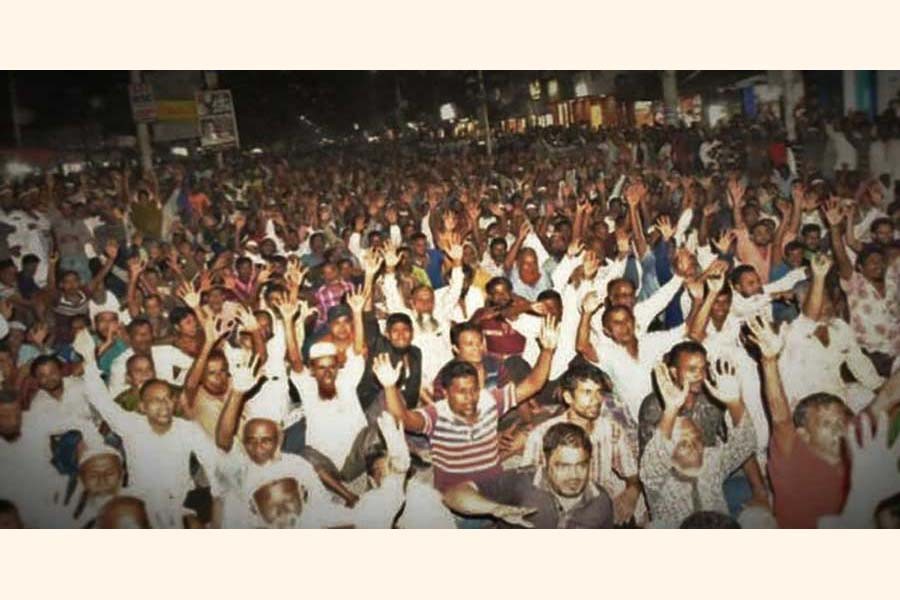KHULNA, Nov 03: State-owned jute mill workers want implementation of the national wages commission.
They also want cancellation of the decision of public-private partnership (PPP) and payment of PF and gratuity money of the retired workers and employees.
Sources said, if no initiative was taken in this regard, Khulna state jute mill workers' leaders would announce a strict programme including issuing ultimatum.
State-owned Jute CBA-Non-CBA campaign convenor Sardar A. Hamid presided over a meeting in this regard at Khalishpur People's Round Square.
CBA non-CBA leaders from jute mills across the country attended the rally under the leadership of Abu Dawood Deen Mohammad, the CBA president of the Khalishpur Jute Mill.
After two spells of 'movement,' and two rounds of meetings with senior officials including the BJMC chairman, there was no result, they said.
In such a situation, Jute Mill Workers League leaders announced various programmes including protests in every jute shift on November 02 and 09, besieging the BJMC headquarters on November 12, a human chain in front of National Press Club, procession and memorandum to the Prime Minister's Office on November 13. They said that there would be strike and agitation in the factories if their demands were not accepted.
At a press conference held at Dhaka Reporters Unity (DRU) in Segunbagicha in the capital city on October 23 Bangladesh Jute Mill Workers League leaders demanded the implementation of the Wage Commission-2015, the implementation of the PM's declaration on the payment of provident fund, gratuity and due payment of dead workers' insurance arrears and also the retired workers, and the arrangement for the sale of non-management jute product about Tk 6.73 billion.
According to the law, they demanded 36 months' salary for the family of the workers who died while working.
Earlier, the Jute Mill Workers League wrote to the BJMC chairman on October 23 requesting action within a week to implement the nine-point demand, including implementation of the national wage scale announced by the government, warning of taking up the agitation programme.
At present, there are 25 jute mills under BJMC under the Ministry of Textiles and Jute. Of these, 22 are jute mills and three are non-jute factories. In Khulna regional state owned jute-mill the named Crescent Jute Mill, Daulatpur Jute Mill, Star Jute Mill, Platinum Jubilee Jute Mill, Khalishpur Jute Mill, Eastern Jute Mill, Alim Jute Mill, JJI Jute Mill of Jashore and Carpeting Jute Mills.
Shana Sharmin, CBA president of Platinum Jute Mill, said the workers were living inhumane lives without getting wages. Many are spending half a day starving. Jute mill officers are paid salaries according to the pay scale of 2015, but now workers are getting wages on the basis of the Wage Commission of 2010 which is not enough to maintain a family. Currently the monthly basic wage of a regular worker is Tk 4,150.
"If the wage scale of 2015 is implemented, the monthly minimum wage will stand at Tk 8,300," she said.
"The PF and gratuity money has been outstanding since July 2013. How can jute workers survive in such insecurity?" she said and hoped the government would take the matter seriously.
Asked about the reserve of jute products, Md. Mamun Khan, administrative officer of Bangladesh Jute Mill Corporation Khulna Regional Office, said that till now, there are reserves of 30,000 tonnes of jute products, which has a market value of Tk 28.2 million. He declined to comment on the delay of implementation of the National Wage Commission-2015.
Although the government-declared National Wage Commission-2015 which was to have been implemented in all state-owned sector mills, BJMC workers are still deprived. So, the jute mill workers want implementation of the Wage Commission.
The BJMC and the mill authorities say that due to financial crisis it is not possible to pay the wages on time.


